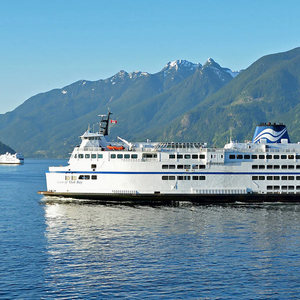BC Ferries reduces emissions with biodiesel

SOURCE: BC Ferries
November 11, 2022
BY BC Ferries
BC Ferries has removed the equivalent of nearly 3,000 cars from the road over the past year and did so without altering a single sailing, or the customer experience. The key to the company’s success is in its recently released 2022 BC Ferries Clean Futures Plan.
Ninety-eight per cent of BC Ferries’ greenhouse gas emissions comes from the combustion of fuels by vessels, so to reduce that footprint the company needs to move customers in a more environmentally positive manner.
“Normally we run our fleet on ultra-low sulphur diesel that contains at least 5 percent biodiesel (B5),” says Frank Camaraire, director, climate change policy for BC Ferries. “But we wanted to accelerate our goal to meet emissions targets and embrace our environmental responsibility so we seized an opportunity to do both”.
The most high profile examples in the evolution of ferry travel are the six hybrid battery-electric Island Class ferries, the two LNG Spirit Class ships, and the four LNG Salish Class vessels. Less visible examples of BC Ferries ‘greening of the fleet’ are the Queen of Oak Bay and Queen of Surrey. The 41-year old Queen of Oak Bay has a secret ingredient making her more environmentally friendly – 20 percent biodiesel (B20).
Biodiesel is a clean burning diesel replacement made from vegetable oils or animal fats that can be used in existing diesel engines. When the time came for BC Ferries to renew its fuel agreement with Parkland Corp., the company offered an innovative, new fuel mixture.
“Through our Burnaby Refinery, Parkland has been a leader in the production of low-carbon fuels since 2017,” said Ryan Krogmeier, senior vice-president, refining, supply, trading, HSE, Parkland. “Increasingly, our commercial customers are looking for ways to decrease their carbon emissions. Driven by our innovative practices, we’re able to provide them with the lower carbon fuels they desire. We’re thrilled to be extending our long-standing partnership with BC Ferries, and to be able to significantly lower the carbon intensity of the fuels they depend on.”
Running rich on biofuel presented some key findings early on.
“We started the transition in October 2021,” says Babak Motamedi, captain of the Queen of Oak Bay. “During this time my colleagues and I have not seen any difference in operation of the machineries and propulsion system with regards to ship’s speed and maneuvering characteristics.”
While the B20 conversion was taking place on the Queen of Oak Bay, the Queen of Surrey has been undergoing a similar trial using renewable diesel. It comes from a similar feedstock as biodiesel but undergoes a different process.
“Renewable diesel has fantastic properties and it will play an integral role through the energy transition as society strives to lower emissions,” said Krogmeier. “Much like co-processed fuels, renewable diesel is chemically identical to conventional diesel and can be dropped into existing systems without any modifications. In addition to its obvious economic benefits, renewable diesel reduces greenhouse gas emissions by up to 75 per cent.”
The two trials have eliminated 13,200 tonnes of greenhouse gas emissions from October 2021 through June 2022. That’s similar to removing 2800 cars from the road for an entire year with far more ambitious goals on the horizon.
“We are preparing to transition all of our Metro Vancouver based vessels that currently use conventional diesel fuel to B20 over the next year while exploring opportunities to increase the biodiesel content all the way up to 100 per cent (B100),” says Camaraire. “
The new fuel frontier is exciting and includes possibilities with renewable natural gas, green methanol, and electricity. However, BC Ferries knows that new fuel technology isn’t the only avenue to get to net zero. Fuel is one of five areas of action identified in the Clean Futures Plan:
•Renewable and alternate fuels
•Electrification
Advertisement
•Operational efficiencies
•Advanced Technologies
•Fleet Modernization
The 2030 target for BC Ferries is to reduce the company’s 2008 greenhouse gas emissions by at least 27 per cent while addressing the demands of a growing population calling for increased service.
”There is no lack of ambition to meet our goals; it’s about how we get there,” says Camaraire. “That’s where the five areas of action come in to play, and by applying innovation, and technical solutions to each area we are creating the momentum that sails us to a net zero horizon.”
Did you know?
Advertisement
•In 2022, BC Ferries GHG emissions were 5 percent below 2008 baseline levels
•In 2021, BC Ferries was honoured with two environmental awards for lowering emissions: Blue Circle Award by the Vancouver Fraser Port Authority and Green Wave Award by the Prince Rupert Port Authority
•In 2014, BC Ferries joined Green Marine which is a voluntary environmental certification program for the North American marine transportation industry
Related Stories
The public comment period on the U.S. EPA’s proposed rule to set 2027 and 2027 RFS RVOs and revise RFS regulations closed Aug. 8. Biofuel groups have largely expressed support for the proposal but also outlined several ways to improve the rulemaking.
In celebration of World Biodiesel Day, MOL Group on Aug. 8 announced SAF was successfully produced for the first time at INA’s Rijeka Refinery during a pilot project to process biocomponent. Renewable diesel was also produced.
Iowa farmers have a new market opportunity for their 2025 soybean crop. Landus is expanding its Clean Fuel Regulation initiative, made possible by recent policy changes expected to increase Canada's demand for liquid biofuel.
Topsoe, a leading global provider of advanced technology and solutions for the energy transition, has been selected as the renewable diesel technology partner for CountryMark’s Mount Vernon, Indiana refinery.
The U.S. exported 35,953.6 metric tons biodiesel and biodiesel blends of B30 or greater, according to data released by the USDA Foreign Agricultural Service on Aug. 5. Biodiesel imports were at 2,148.9 metric tons for the month.
Upcoming Events










